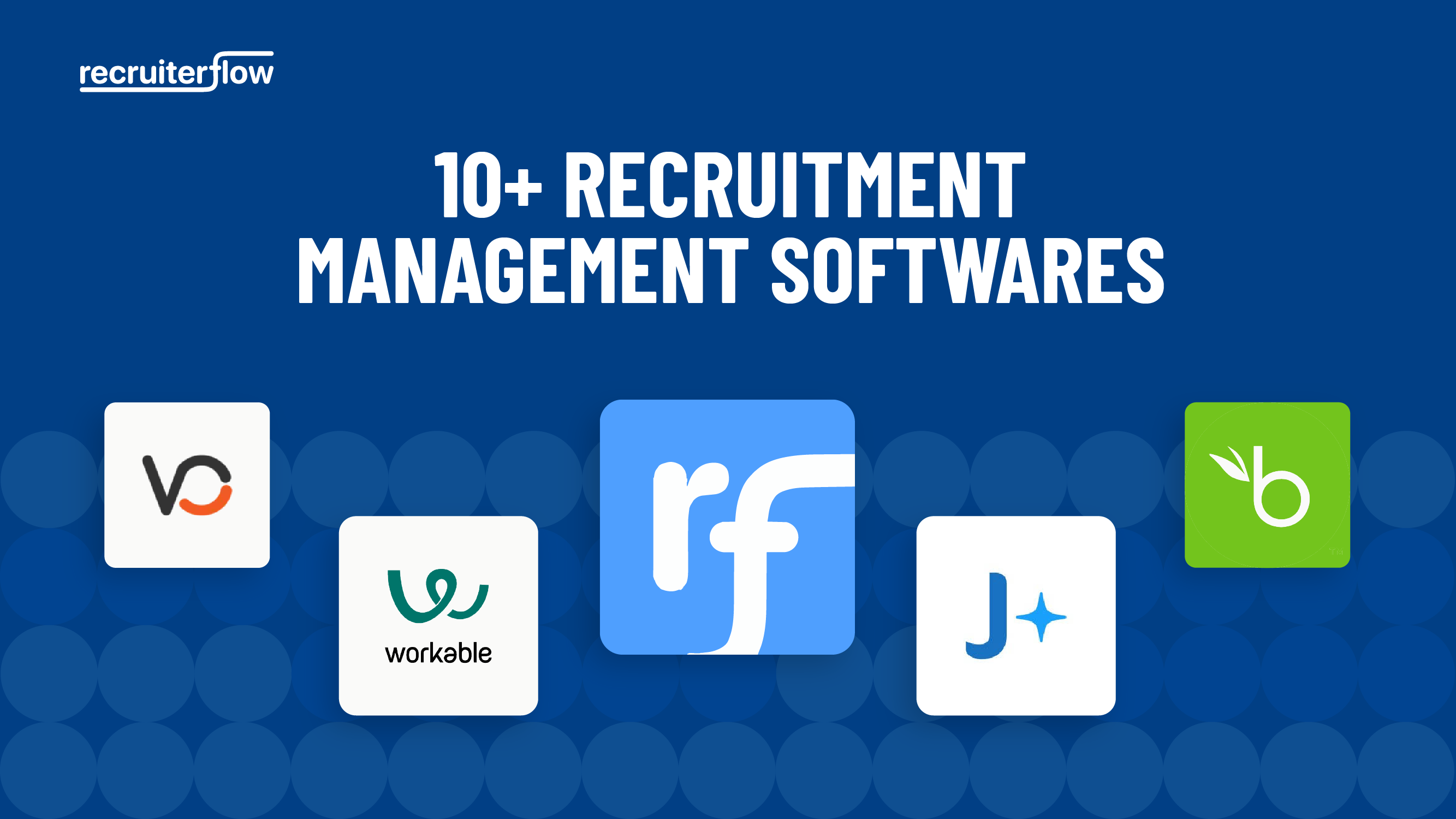
Benefits of Using AI in Recruitment
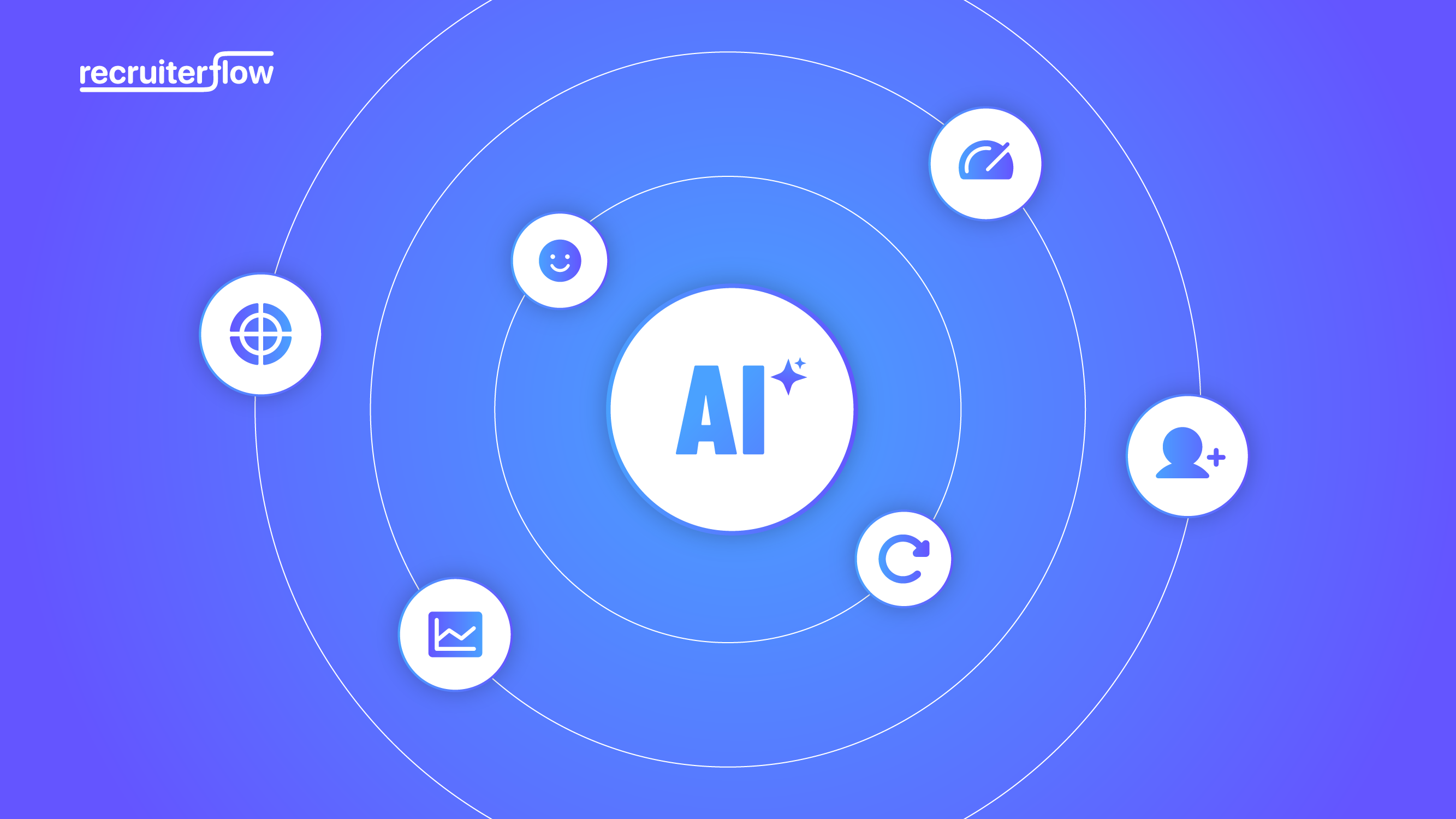
Recruiters at agencies need to find top talent fast and in ways that are both fair and efficient. Balancing tasks like shortlisting, reaching out to candidates, and matching them to roles can feel overwhelming. This gets even tougher when you are dealing with hundreds of applications and specific client needs at the same time.
In 2025, using AI isn’t futuristic or out of reach. It has already started changing the way agencies handle work. AI helps shift your attention to the important tasks like building connections, promoting client values, and achieving real results. It allows you to work smarter without working harder.
This piece dives into how AI is reshaping hiring and highlights the benefits of using AI in recruitment, the challenges to watch out for, and how tools, such as Recruiterflow, bring AI to agency recruiters in a practical way.
How is AI Shaping Recruitment Today?
The influence of AI on hiring extends way past basic resume filtering or AI-powered chat tools. These days, AI operates like a hiring assistant that cuts down loads of repetitive tasks that used to keep recruitment teams stuck for hours.
Shifting from Boring Tasks to Important Work
Hiring teams used to spend hours reviewing resumes each week. Today, AI recruiting tools scan thousands of applications in seconds. They pick out promising candidates by using detailed standards instead of just checking for popular keywords.
Machine learning studies trends from past successful hires. It helps spot overlooked talent and ensures strong applicants aren’t ignored because their backgrounds are unusual.
AI Makes Work Faster and Smarter
AI takes care of tasks and changes the way they’re completed. Video tools now assess candidates by studying both what they say and how they say it.
Chatbots give candidates quick replies and make interview scheduling easier and tools like an AI voice agent can support voice-based interactions at scale.. They eliminate the need for ongoing back-and-forth messages. Predictive analytics also provides insights to predict which candidates will perform well in a role. This helps hiring teams make better and faster decisions.
Improved Interaction with Candidates
Personalized experiences, once available to top candidates, can now reach everyone. AI creates customized outreach and job postings, keeps applicants updated about their progress, and helps every candidate feel acknowledged, even if they are not chosen.
Exploring Fresh Opportunities
Top agencies already share big gains from AI. PAC Solutions doubled placement rates after adopting Recruiterflow–thanks to AI-generated call summaries and interview question prompts, automated workflows (saving 270+ recruiter-days in a year), and smart candidate-client pipelines.
Cut admin work, increase placements and let your recruiters focus on conversations, not spreadsheets. Discover how with Recruiterflow AI.
Key Benefits of Using AI in Recruiting
Taking Over Repeat Tasks
AI handles many boring parts of recruiting. Tools using AI can sift through and analyze resumes, find potential candidates, and even reach out to them early on. Platforms like Recruiterflow use AI-powered resume-parsing features to organize and format candidate details.
Agencies allow their staff to focus on building connections and making smarter hiring choices by letting automation handle tasks like screening resumes and finding candidates.
Recruiting tools powered by AI make everything faster. Recruiters can go through thousands of profiles, pick out the strongest candidates, and move them through the process without extra effort.
Faster Recruiting Process
AI tools cut down the time it takes to hire. Systems that match and score candidates mean recruiters spend half the time they used to on each hire.
Research shows AI can reduce the time spent finding candidates by 30 percent. This lets agencies connect with potential hires much sooner.
Tools like Recruiterflow’s AI-powered match system highlight top candidates right away and take care of scheduling interviews, helping jobs get filled weeks earlier than normal methods would.
BardWood, a leading recruitment firm specializing in staffing solutions for the UK facilities industry, reduced its time-to-hire by 50% using Recruiterflow’s AI-first platform.
AI chatbots now handle interview scheduling by syncing calendars and cutting out back-and-forth emails. This approach speeds up hiring. Many agencies see faster hires and better placement rates when they use AI in systems like ATS and CRM.
Better Hires Made Possible
AI boosts hiring quality by zeroing in on the most suitable candidates. Its advanced algorithms sort through skills, experience, and even cultural compatibility to create stronger matches.
Agencies using AI tools often see a 35% increase in the quality of their hires. Tools like Recruiterflow’s AI matching analyze job needs and rank top candidates, and help recruiters focus on the best-fit talent instead of wasting time on less likely matches.
Data insights from these systems let recruiters make better hiring choices. Instead of relying on guesses, they can match candidate profiles to success signals proven to work. This focused process results in employees who perform well and stay longer. Metrics like “quality-of-hire” highlight these improvements.
Better Experience for Candidates
AI makes the hiring process easier and more helpful for job seekers. Candidates get quicker responses and personalized options. Features like automatic updates, job matches, and all-day chat support keep them engaged and informed.
For instance, AI chatbots handle common questions and set up interviews, saving time and avoiding confusion. AI tools also suggest jobs tailored to a candidate’s skills, increasing the chances that they will apply.
Studies say that 75 percent of people searching for jobs like AI processes because they are quick and clear. AI tools allow agencies to automate updates and share timely feedback with the help of analytics. This helps agencies offer job seekers a respectful and responsive experience, which also improves how people view the employer.
Here are some important ways AI improves the job application journey:
- Custom Job Recommendations: AI provides job suggestions based on what fits each person’s skills and preferences.
- Fast Chatbots: Virtual support tools answer questions and share updates right away.
- Automated Interviews: Tools deliver video assessments and give feedback fast.
Handling More Applicants at Scale
AI handles big talent pools. Machine learning tools scan thousands of profiles in no time, letting agencies hire more people faster without slowing down.
When companies need lots of new workers fast, like during seasonal hiring or growth spurts, AI-powered tools get through massive application lists in seconds. They work just as well, even when there are tons of applicants.
A survey by Talent Tech Labs found that 65% of businesses improved how well they scale hiring after using AI. This means even a small hiring team can juggle dozens of open roles all at once without giving up speed or quality.
Take Recruiterflow’s AI as an example; it creates candidate shortlists no matter how large your database gets. Whether it’s one job or a hundred openings, it keeps things running.
Using Predictive Analytics to Achieve Better Results
AI doesn’t just respond anymore. It predicts. It studies past hiring details to guess future needs and how well candidates might perform. A predictive analytics model powered by AI can, for instance, estimate which candidates are likely to thrive over time or identify roles that might take longer to fill.
Recruiterflow is an example of this kind of learning system. When a recruiter marks a candidate as lacking specific experience, it takes note. Over time, it adjusts and gets better at making accurate matches.
On a broader scale, predictive analytics helps agencies fine-tune their hiring processes. It lets them see which positions need more effort to source candidates, figure out how likely offers will be accepted, or tweak their approach to fix issues before they arise.
Targeted Communication and Tailored Messaging
AI allows engagement to feel more personal, even on a large scale. Platforms such as Recruiterflow use intelligent email sequencing where each email adapts to fit the recipient.
For example, the platform builds outreach messages by referring to details from a candidate’s resume and the job listing. This helps create “personalized email sequences” that encourage higher response rates.
AI chatbots also follow up with candidates who stop responding. By reviewing previous interactions and preferences, AI customizes communications. This makes candidates feel like recruiters “understand” them.
AI also uses a candidate’s profile and history to provide tailored suggestions or content. This leads to communication that feels human-like, while still reaching thousands of candidates at once, without requiring manual work.
AI for Interview Scheduling and Candidate Assessments
Organizing interviews often becomes a big hassle, but AI manages it without manual effort. Advanced hiring tools connect to calendars to find the best timings and schedule interviews, avoiding endless email threads.
Take Recruiterflow as an example. Its built-in automation sets up interview slots and sends out reminders and helps reduce the chances of missed meetings.
AI also plays a role in candidate assessments. Video interview platforms rely on AI to review and score answers using structured criteria.
These platforms ask every candidate identical questions and grade replies. This ensures a fair process for everyone. Automating interview scheduling and screening gives recruiters more free time every week.
Agencies say AI-powered scheduling and automated video or skill assessments reduce their administrative work a lot. This lets recruiters focus more on candidates who show real potential.
Data-Driven Reports and Continuous Growth
AI tools create detailed analytics to improve processes over time. Recruiterflow provides reporting dashboards with “AI-driven insights” that monitor KPIs such as time-to-fill, source efficiency, and hire quality in real time.
These reports use data to show trends and problem areas. For instance, they can notify an agency when a job board starts bringing in fewer qualified candidates.
Recruiterflow also offers tools like goal tracking and team leaderboards. Managers can use these to find top-performing employees and pinpoint teams that need support.
AI improves by learning through feedback. When a recruiter changes a candidate’s rank or status, the system takes that information and uses it. This learning process keeps adjusting the algorithms over time as the system processes more data.
This setup helps agencies grow and perform better. They use the collected data to adjust sourcing strategies, set clearer hiring goals, and rely on the AI to improve in matching their specific demands during every hiring round.
Drawbacks of AI in Recruitment
While AI offers many benefits, it is not free of issues. Skilled agency recruiters must identify where these flaws exist:
Possibility of Built-in Bias
AI relies on the data it learns from. If the training data contains past biases, AI might repeat those biases. This could work against efforts to include more variety in talent pools.
Missing the Human Element
Building relationships is key in recruiting. Applicants might see AI-led processes as cold or unrelatable. Talking to chatbots instead of humans can make people feel disconnected or unsure about the fairness of the process.
Problems With Clarity and Understanding
Complex algorithms make it tough to explain why someone gets rejected or chosen during hiring. A lack of transparency can hurt trust and even lead to legal trouble if a candidate questions these decisions.
Data Privacy and Security
Storing more candidate data online increases the chance of hacks or breaches. Mishandling private information can hurt a company’s reputation or lead to serious legal problems.
Risk of Mistakes
All AI recruitment technology is not the same. Basic rule-bound screening can miss great candidates who might be perfect but didn’t use specific keywords or took an unconventional route.
Conclusion
AI gives recruiters more hours to focus on real work, like guiding clients, forming connections, and achieving great results, by handling boring tasks and boosting insights.
Though the path has its hurdles like bias, lack of personal touch, and fresh privacy issues, using AI can boost your team’s efficiency, improve candidates’ experiences, and strengthen profits. The trick is finding harmony. Let AI take care of repetitive tasks, but don’t lose your personal touch that sets you apart.
Tools such as Recruiterflow give recruiters the ability to use AI with practical features designed to deliver results. In an era shifting quickly toward digital hiring, the agencies that use AI’s strengths while holding onto the human side of recruiting will succeed.
How Can Recruiterflow Help?
Agency recruiters who need smart and useful AI tools will find Recruiterflow unique. It works as an AI-first platform that offers a unified ATS & CRM with a host of features designed to help recruiters remove admin and focus on what matters: placing more candidates.
Recruiterflow also has an extensive suite of AI Agents designed directly into the workflows. This means, agencies don’t have to pay extra to use AI on Recruiterflow.
The key offerings include:
AI Agents
Recruiterflow does not layer AI on top — it’s built into every part of the workflow, creating a digital workforce twin for recruiters. AI Agents remember interactions across calls, emails, SMS, and notes, and take over admin, ensuring recruiters focus on conversations and decisions.
AI Note Taker
While most note takers use information from a single call to summarize and share insights, Recruiterflow’s AI Note Taker uses information from past conversations across emails, calls, and recruiters’ notes, converting them into well-structured, actionable insights.
ATS & CRM
From custom pipelines and job postings to resume tracking and deal management, Recruiterflow’s unified ATS and CRM ensures recruiters never need to switch tabs. And the best part? AI is embedded in every workflow.
Multichannel Sequences
With Multichannel sequences, recruiters can engage with prospects where they are, be it email, SMS, calls, or social media. AI agents like email generation agent, job description agent and AIRA create personalized emails based on improving response rate by up to 60%.
Workflow Automation
Recruiters spend a lot of time on admin. Recruiterflow’s workflow automations reduce admin tasks, giving recruiters their time back. From candidate check-ins and interview reminders to BD alerts and onboarding nudges, the processes are executed effortlessly.
Advanced Reporting and Recruiterflow BI
With Recruiterflow, recruiters can track everything that matters — revenue per recruiter, job performance, deal pipeline, and more. Define custom KPIs, build real-time dashboards, and let AI surface insights to point out exactly what’s working and what isn’t.
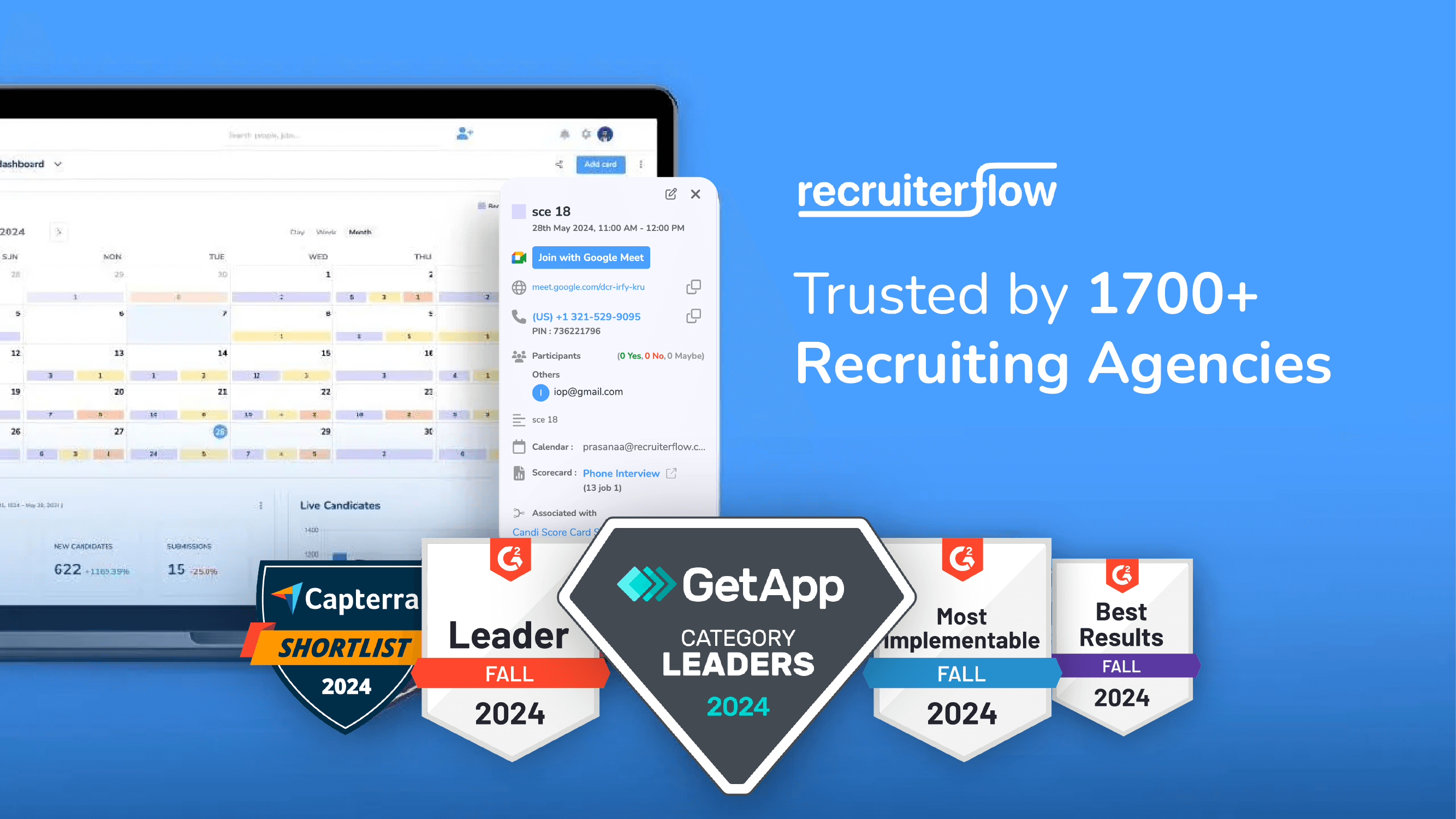
Trusted by 1700+ agencies, Recruiterflow is known for its intuitive UI/UX that ensures high adoption from day 01. There’s no training module required to get started.
To see Recruiterflow in action, Book a free demo.
Recruitment
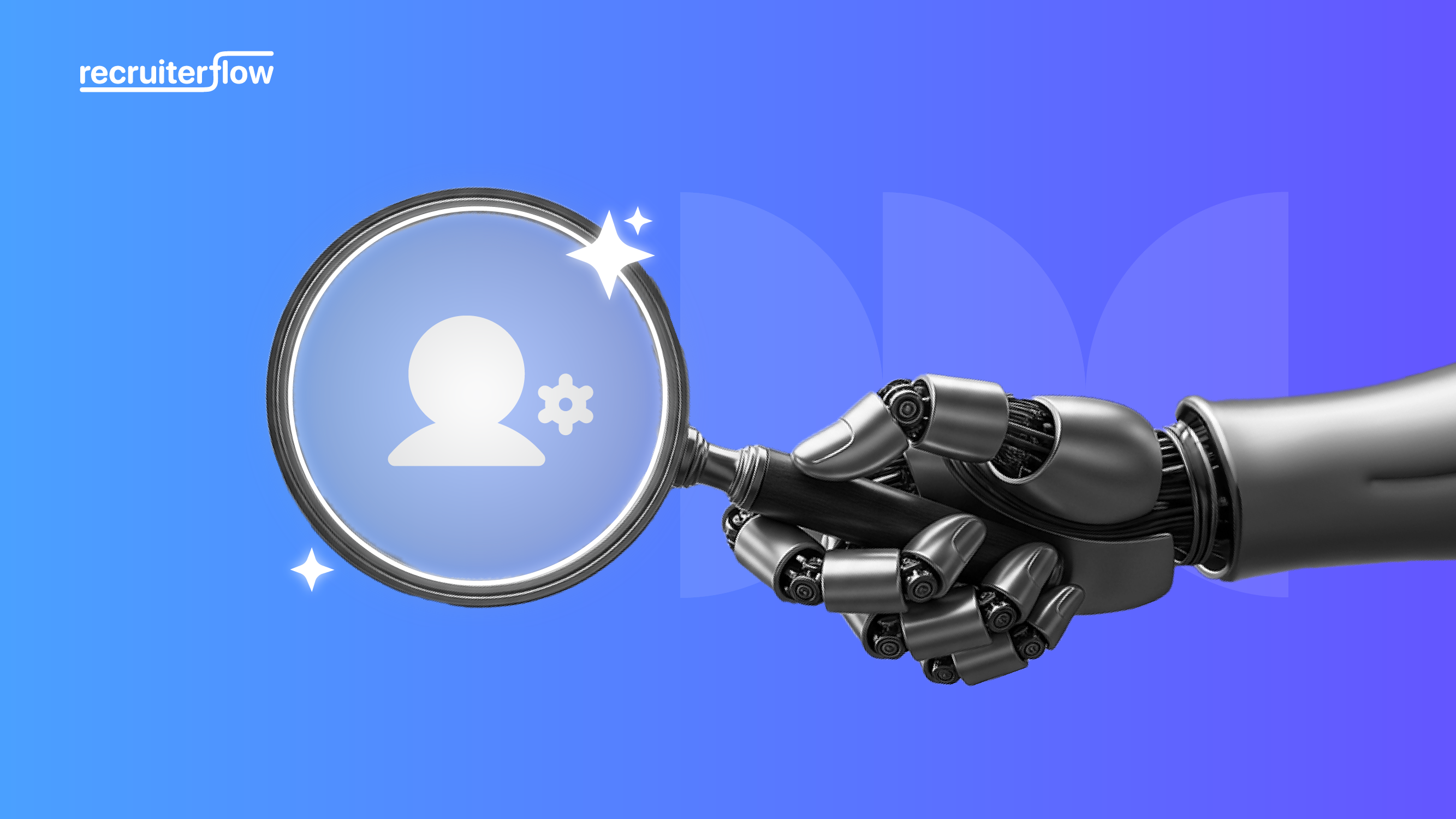
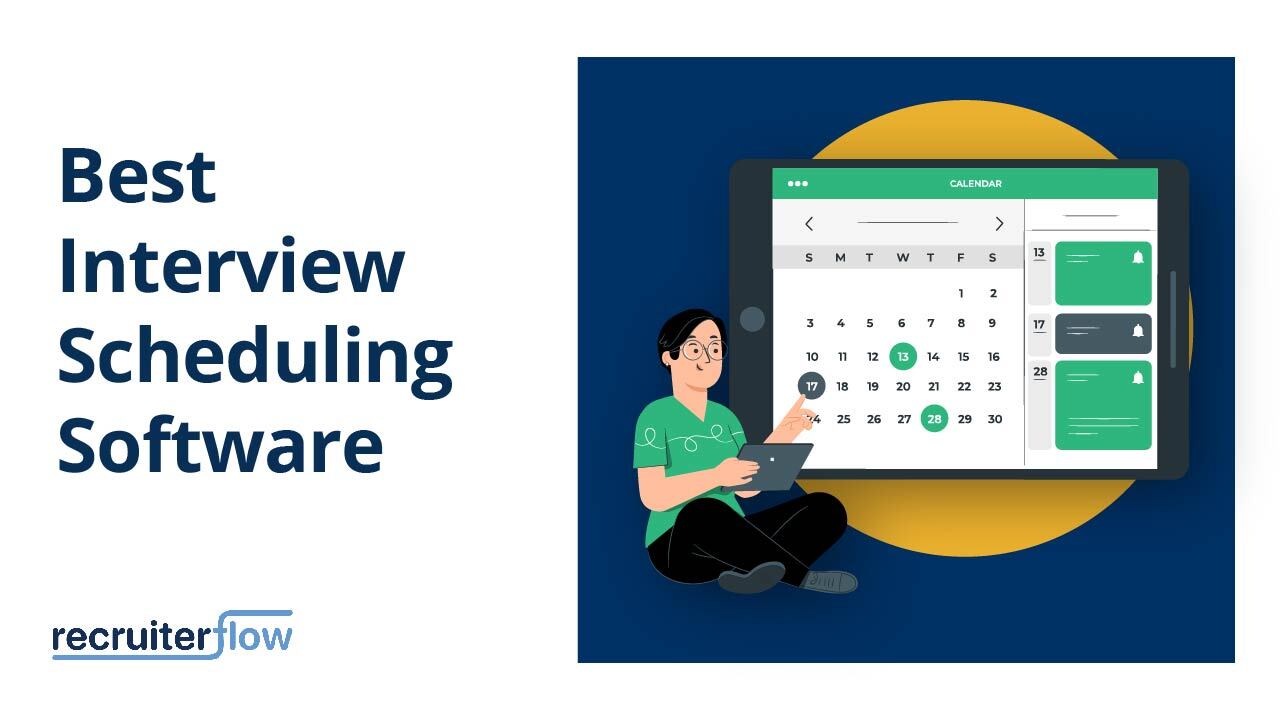
Pragadeesh Natarajan